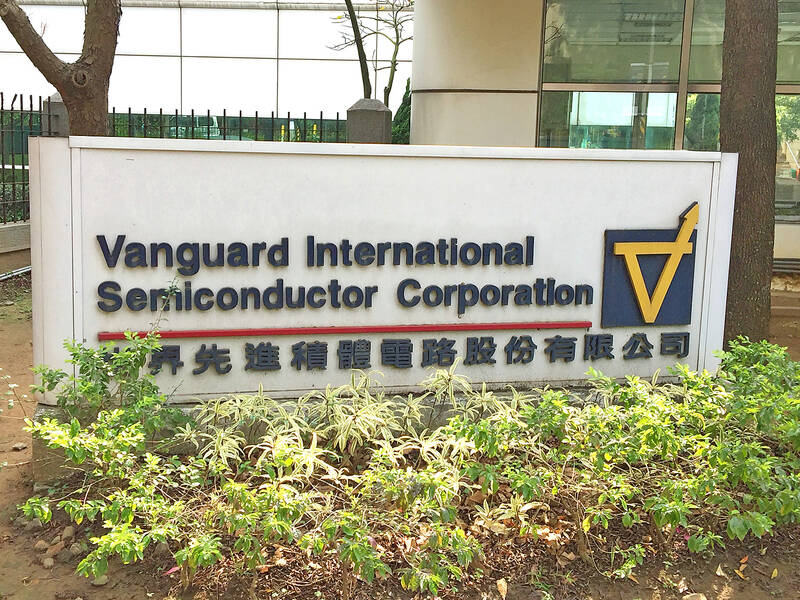Vanguard International Semiconductor Corp (世界先進), which makes power management chips and display driver chips, expects moderate sales growth this year, aided by healthy supply chain inventory and rising demand from China due to its economic stimulus measures.
“This year would be better than last year. On a sequential basis, we expect a gradual recovery each quarter following a similar pattern to last year,” Vanguard vice president Claire Chen (陳姿鈞) told a virtual investors’ conference yesterday.
Factory utilization would improve to between 70 and 80 percent this year, from 65 percent in the final quarter of last year, Vanguard said, without factoring in potential impact from the macro environment.

Photo: Grace Hung, Taipei Times
Vanguard expects direct impact from the US’ tariff policy would be “trivial” as only a tiny portion of its chips are shipped directly to the US, company chairman Fang Leuh (方略) said, adding that the company is not considering building a factory in the US.
However, its indirect impact on the entire semiconductor industry could be enormous, as potential US tariff hikes on electronics, high-tech products and vehicles would lead to a jump in inflation and electronics prices, he said.
That could weaken consumer spending and ultimately diminish US economic growth and semiconductor demand, he added.
Even so, Vanguard’s plan to build a 12-inch wafer fab in Singapore with NXP Semiconductor NV would proceed as scheduled, it said, adding that it would ramp up production in 2027.
To fund the fab’s construction, Vanguard plans to expand its capital expenditure this year to between NT$60 billion and NT$70 billion (US$1.83 billion to US$2.13 billion) compared with NT$15.94 billion last year.
This quarter, wafer shipments are forecast to expand between 8 and 10 percent sequentially, Vanguard president John Wei (尉濟時) said, attributing the growth to rising demand from China and customers’ requests to ship products ahead of schedule amid concern over US tariff hikes.
Vanguard would also recognize income from its long-term supply agreements, accounting for about 2 percent of its total revenue, Wei said.
Average selling prices are forecast to dip about 4 to 6 percent sequentially this quarter, he said.
Gross margin would improve to between 29 percent and 31 percent compared with 28.7 percent last quarter, while factory utilization rate would climb to between 70 and 75 percent from 65 percent a quarter earlier, he said.
Vanguard’s net income fell 4.4 percent to NT$7.05 billion last year, the weakest ever. Earnings per share dropped to NT$4.16 from NT$4.43.
The company’s board of directors approved a proposal to distribute cash dividends of NT$4.5 per common share, the same as last year, with the money coming from its reserve income.

When Lika Megreladze was a child, life in her native western Georgian region of Guria revolved around tea. Her mother worked for decades as a scientist at the Soviet Union’s Institute of Tea and Subtropical Crops in the village of Anaseuli, Georgia, perfecting cultivation methods for a Georgian tea industry that supplied the bulk of the vast communist state’s brews. “When I was a child, this was only my mum’s workplace. Only later I realized that it was something big,” she said. Now, the institute lies abandoned. Yellowed papers are strewn around its decaying corridors, and a statue of Soviet founder Vladimir Lenin

UNIFYING OPPOSITION: Numerous companies have registered complaints over the potential levies, bringing together rival automakers in voicing their reservations US President Donald Trump is readying plans for industry-specific tariffs to kick in alongside his country-by-country duties in two weeks, ramping up his push to reshape the US’ standing in the global trading system by penalizing purchases from abroad. Administration officials could release details of Trump’s planned 50 percent duty on copper in the days before they are set to take effect on Friday next week, a person familiar with the matter said. That is the same date Trump’s “reciprocal” levies on products from more than 100 nations are slated to begin. Trump on Tuesday said that he is likely to impose tariffs

HELPING HAND: Approving the sale of H20s could give China the edge it needs to capture market share and become the global standard, a US representative said The US President Donald Trump administration’s decision allowing Nvidia Corp to resume shipments of its H20 artificial intelligence (AI) chips to China risks bolstering Beijing’s military capabilities and expanding its capacity to compete with the US, the head of the US House Select Committee on Strategic Competition Between the United States and the Chinese Communist Party said. “The H20, which is a cost-effective and powerful AI inference chip, far surpasses China’s indigenous capability and would therefore provide a substantial increase to China’s AI development,” committee chairman John Moolenaar, a Michigan Republican, said on Friday in a letter to US Secretary of

Taiwan Semiconductor Manufacturing Co’s (TSMC, 台積電) market value closed above US$1 trillion for the first time in Taipei last week, with a raised sales forecast driven by robust artificial intelligence (AI) demand. TSMC saw its Taiwanese shares climb to a record high on Friday, a near 50 percent rise from an April low. That has made it the first Asian stock worth more than US$1 trillion, since PetroChina Co (中國石油天然氣) briefly reached the milestone in 2007. As investors turned calm after their aggressive buying on Friday, amid optimism over the chipmaker’s business outlook, TSMC lost 0.43 percent to close at NT$1,150